英语常用句型
(完整版)英语常用句型大全
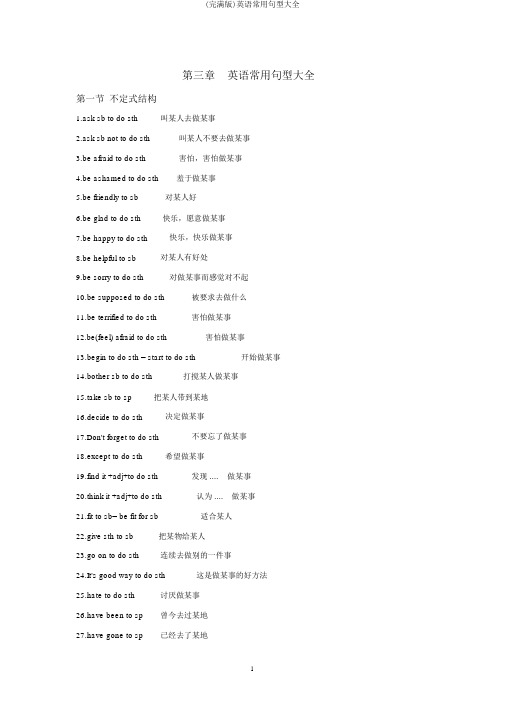
第三章英语常用句型大全第一节不定式结构1.ask sb to do sth叫某人去做某事2.ask sb not to do sth叫某人不要去做某事3.be afraid to do sth害怕,害怕做某事4.be ashamed to do sth羞于做某事5.be friendly to sb对某人好6.be glad to do sth快乐,愿意做某事7.be happy to do sth快乐,快乐做某事8.be helpful to sb对某人有好处9.be sorry to do sth对做某事而感觉对不起10.be supposed to do sth被要求去做什么11.be terrified to do sth害怕做某事12.be(feel) afraid to do sth害怕做某事13.begin to do sth = start to do sth开始做某事14.bother sb to do sth打搅某人做某事15.take sb to sp把某人带到某地16.decide to do sth决定做某事17.Don't forget to do sth不要忘了做某事18.except to do sth希望做某事19.find it +adj+to do sth发现 ....做某事20.think it +adj+to do sth认为 ....做某事21.fit to sb= be fit for sb适合某人22.give sth to sb把某物给某人23.go on to do sth连续去做别的一件事24.It's good way to do sth这是做某事的好方法25.hate to do sth讨厌做某事26.have been to sp曾今去过某地27.have gone to sp已经去了某地28.have sth to do有什么事情要做29.hope to do sth希望做某事30.introduce sb to sb介绍某人给某人认识31.invite sb to do sth邀请某人做某事32.It takes sb +一段时间 +to do sth花多久时间做某事33.It's +adj+ to do sth做某事怎么样34.It's a good idea for sb to do sth对某人来说去做某事是个好想法35.learn to do sth学着去做某事36.make a decision to do sth下定信心做某事37.want to do sth想要做某事38.need to do sth需要去干某事39.offer sth to sb给某人供应某物40.pretend to do sth装着去做某事41.take sth to sb带某物给某人42.like to do sth喜欢做某事43.show sth to do把某物拿给某人看44.encourage sb to do sth激励某人去做某事45.warn sb to do sth劝说某人做某事46.be used to do sth被用来做某事47.It's best to do sth最好去看某事48.stop to do sth停下来往做某事49.Have nothing to do with与做某事不有关50.be allowed to do被同意做某事51.forget to do sth忘记做过某事52.would like to do sth想要做某事53.prefer sth to sth喜欢某物胜过某物54.Prefer to do sth rather than do喜欢做某事胜过做某事55.Say hello to sb向某人问好56.It's time to do sth是做某事的时间到了57.trouble sb to do sth麻烦某人某事58.tell sb to do sth叫某人做某事59.need to do sth需要干某事60.It's a good place to do sth它是做某事的好地方第二节动原结构1.Would you please do sth请你做某事2.can do sth能够做某事 may ,must,could,might,would,should,shall3.be going to do sth打算,将去做某事4.need do sth必定干某事5.had better do sth最好干某事6.have to do sth不得不去做某事7.let sb do sth让某人做某事8.make sb do sth使得某人做某事9.have sb do sth让某人做某事10.Why not do sth为什么不去做某事11.Why don't you do sth你为什么不去做某事12. 句子里面有 do,does,don't,does't did,didn't ,后边动词 +do sth13.prefer to do sth rather than do sth喜欢做某事而不去做某事14.would rather do sth than do sth宁愿而不ed to do sth过去常常做某事16.do nothing but do sth除了做 sth不能够做任何其他事情17.help sb do sth帮助某人做某事18.Feel,listen,look,see,hear,notice,wacth+do sth19.please do sth请做某事20. 神情动词〔 can,may,must,will,ought. to ,might,could,dare to )+动原〔 do sth)第三节动词 ing句型1.feel like doing sth想要做某事2.stop.... .from doing sth阻拦。
英语最常用的60个句型及例句
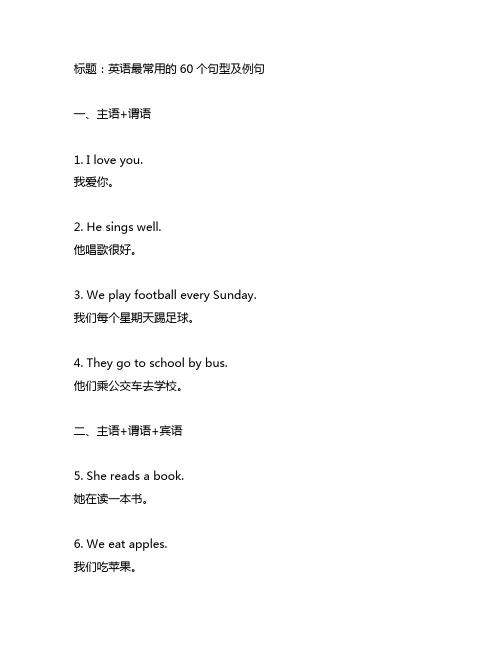
标题:英语最常用的60个句型及例句一、主语+谓语1. I love you.我爱你。
2. He sings well.他唱歌很好。
3. We play football every Sunday. 我们每个星期天踢足球。
4. They go to school by bus.他们乘公交车去学校。
二、主语+谓语+宾语5. She reads a book.她在读一本书。
6. We eat apples.我们吃苹果。
7. He speaks English.他讲英语。
8. They watch TV.他们看电视。
三、主语+谓语+宾语+宾语补足语9. She paints the wall red.她把墙刷成了红色。
10. We call him a hero.我们称他为英雄。
11. He considers the plan unfeasible. 他认为这个计划不可行。
12. They make their father proud.他们让父亲感到自豪。
四、主语+系动词+表语13. I am a teacher.我是一名老师。
14. She was happy.她很快乐。
15. He is my friend.他是我的朋友。
16. They are students.他们是学生。
五、主语+谓语+间宾+直宾17. She teaches us English. 她教我们英语。
18. He bought her a gift. 他给她买了一份礼物。
19. We tell him a story.我们给他讲故事。
20. They show us the way.他们给我们指路。
六、主语+谓语+宾补+宾语21. She made her sister cry.她让她妹妹哭了。
22. They found the problem solved. 他们发现问题已经解决了。
23. He heard the news spread.他听说了消息已经传开了。
英语常用句型100句

英语常用句型100句1. It's a pleasure to meet you. (很高兴见到你。
)2. How are you? (你好吗?)3. What's your name? (你叫什么名字?)4. Where are you from? (你来自哪里?)5. How old are you? (你多大了?)6. Can you speak English? (你会说英语吗?)7. What do you do for a living? (你的职业是什么?)8. How do you spell that? (你怎么拼写那个?)9. What is your favorite food? (你最喜欢的食物是什么?)10. Where do you live? (你住在哪里?)11. What time is it? (现在几点了?)12. Can you help me? (你能帮助我吗?)13. I don't understand. (我不明白。
)14. Could you please repeat that? (你能再重复一遍吗?)15. How much does it cost? (这个多少钱?)16. Where is the nearest bank? (最近的银行在哪里?)17. What's the weather like today? (今天天气怎么样?)18. I'm sorry. (对不起。
)19. Excuse me. (打扰一下。
)20. Do you have any questions? (你有什么问题吗?)21. Nice to meet you. (很高兴认识你。
)22. How do you do? (你好。
)23. What do you think? (你觉得怎么样?)24. Can I help you? (我能帮你吗?)25. What's your favorite color? (你最喜欢的颜色是什么?)26. Where are you going? (你要去哪里?)27. What do you want to do? (你想做什么?)28. How was your day? (你今天过得怎么样?)29. Can you show me on the map? (你能在地图上给我看吗?)30. What's your phone number? (你的电话号码是多少?)31. How long have you been learning English? (你学英语学了多久了?)32. How far is it from here? (离这里有多远?)33. What's your favorite movie? (你最喜欢的电影是什么?)34. Do you have any siblings? (你有兄弟姐妹吗?)35. What's your favorite book? (你最喜欢的书是什么?)36. What's your favorite sport? (你最喜欢的运动是什么?)37. Can I have a glass of water, please? (请给我一杯水。
100句英语常用句型

100句英语常用句型一、表达观点1.In my opinion,...(在我看来……)2.I think...(我认为……)3.As far as I'm concerned,...(就我而言……)4.It seems to me that...(在我看来……)5.I believe...(我相信……)6.From my perspective,...(从我的角度来看……)7.Personally, I feel that...(就个人而言,我觉得……)二、询问意见8.What's your opinion?(你有什么看法?)9.How do you think about it?(你觉得怎么样?)10.What's your view on this matter?(你对这件事有什么看法?)11.Do you have any thoughts on...?(你对……有什么想法吗?)12.Could you give me your opinion on...?(你能给我你对……的意见吗?)三、同意与不同意13.I agree with you.(我同意你的观点。
)14.I couldn't agree more.(我完全同意。
)15.That's exactly what I think.(那正是我所想的。
)16.I'm of the same opinion.(我有同样的看法。
)17.On the contrary, I don't think so.(相反,我不这么认为。
)18.I disagree with you.(我不同意你的观点。
)19.I'm afraid I can't agree.(恐怕我不能同意。
)20.That's not how I see it.(我不是这么看的。
)四、请求帮助21.Could you help me?(你能帮我吗?)22.Would you please do me a favor?(你能帮我个忙吗?)23.Can you give me a hand?(你能帮我一下吗?)24.I need your help.(我需要你的帮助。
常用英语句型
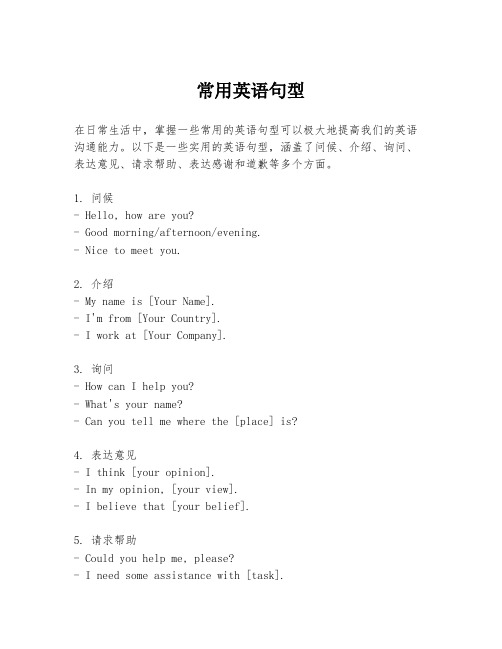
常用英语句型在日常生活中,掌握一些常用的英语句型可以极大地提高我们的英语沟通能力。
以下是一些实用的英语句型,涵盖了问候、介绍、询问、表达意见、请求帮助、表达感谢和道歉等多个方面。
1. 问候- Hello, how are you?- Good morning/afternoon/evening.- Nice to meet you.2. 介绍- My name is [Your Name].- I'm from [Your Country].- I work at [Your Company].3. 询问- How can I help you?- What's your name?- Can you tell me where the [place] is?4. 表达意见- I think [your opinion].- In my opinion, [your view].- I believe that [your belief].5. 请求帮助- Could you help me, please?- I need some assistance with [task].- Would you mind [doing something]?6. 表达感谢- Thank you very much.- I appreciate your help.- Thanks a lot for [what they did].7. 道歉- I'm sorry for [what happened].- I apologize for [your mistake].- Excuse me for [your oversight].8. 邀请- Would you like to [do something]? - Are you free to [do something]?- Let's [do something] together.9. 同意和不同意- I agree with you.- I disagree with your point of view. - That's a good idea.10. 表达喜好- I like [something].- I love [something].- I'm not a big fan of [something].11. 表达需求- I need [something].- I want [something].- I require [something].12. 表达能力- I can [do something].- I'm able to [do something].- I'm capable of [doing something].13. 表达时间- What time is it?- It's [time].- I have to go now.14. 表达地点- Where is [place]?- [Place] is located [directions].- I'm going to [place].15. 表达原因- The reason is [reason].- Because [reason].- Due to [reason].通过学习和练习这些句型,你可以更自信地用英语进行日常交流。
英语常用句型100句
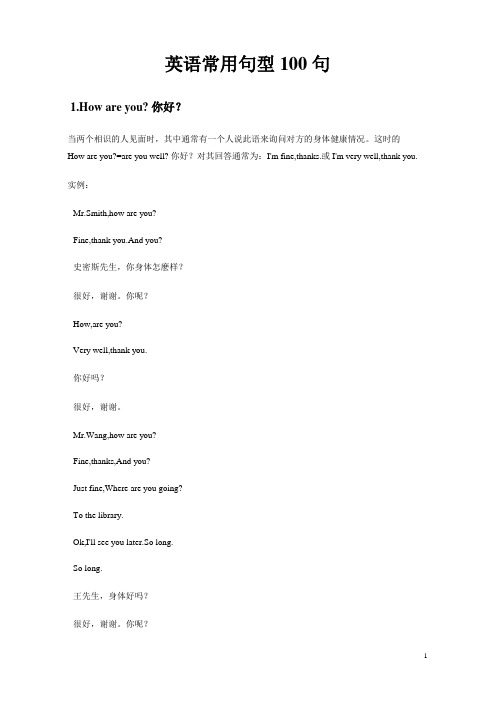
英语常用句型100句1.How are you? 你好?当两个相识的人见面时,其中通常有一个人说此语来询问对方的身体健康情况。
这时的How are you?=are you well? 你好?对其回答通常为:I'm fine,thanks.或I'm very well,thank you.实例:--Mr.Smith,how are you?--Fine,thank you.And you?--史密斯先生,你身体怎麽样?--很好,谢谢。
你呢?--How,are you?--Very well,thank you.--你好吗?--很好,谢谢。
--Mr.Wang,how are you?--Fine,thanks,And you?--Just fine,Where are you going?--To the library.--Ok,I'll see you later.So long.--So long.--王先生,身体好吗?--很好,谢谢。
你呢?--挺好。
你到那儿去?--去图书馆。
--好吧,以后见,再见。
--再见。
2.How is everything with you? 你一切都好吗?此句型表示双方见面后,一方问对方各方面情况,仍为客套话。
类似的说法还有How are things with you? 你一切都好吗?实例:--Hi,Fred!How is everything with you?--Everthing is fine,thank you,What about you?--Quite well.--喂,弗雷德,你好吗?--一切都好,谢谢。
你呢?--很好。
--How are you getting(on,along)with your work?--Very(pretty,quite)well,thank you.--你的工作情况怎样?--很好,谢谢你。
3.Hello! 你好!(喂!)Hello!通常用于以下四种情况:打招呼,打电话,表示惊讶或引起对方的注意。
84个英语基本句型

英语是一门广泛使用的语言,掌握基本句型可以帮助我们有效地表达自己的意思。
下面将介绍84个常用的英语基本句型,希望对大家学习英语有所帮助。
1. 主语 + 动词:I eat.2. 主语 + 动词 + 宾语:She reads books.3. 主语 + 不及物动词:They swim.4. 主语 + 系动词 + 表语:He is happy.5. 主语 + 动词 + 间接宾语 + 直接宾语:She gave me a gift.6. 主语 + 动词 + 宾语 + 宾语补足语:We consider him our friend.7. 主语 + 动词 + 间接宾语 + 直接宾语 + 宾语补足语:They made him their leader.8. 主语 + 动词 + 宾语 + 宾语补足语:He painted the wall red.9. 主语 + 动词 + 宾语 + 间接宾语:She told me a joke.10. 主语 + 不及物动词 + 表语:He became a doctor.11. 主语 + 不及物动词 + 宾语补足语:They elected him president.12. 主语 + 不及物动词 + 宾语 + 宾语补足语:She made him her assistant.13. 主语 + 系动词 + 宾语 + 宾语补足语:I find English interesting.14. 主语 + 系动词 + 表语 + 宾语:She called me a fool.15. 主语 + 系动词 + 宾语 + 宾语补足语:He made me his secretary.16. 主语 + 系动词 + 宾语 + 表语:They named the baby Adam.17. 主语 + 状语 + 动词:We ran quickly.18. 主语 + 状语 + 系动词 + 表语:He felt really tired.19. 主语 + 动词 + 状语:She sings beautifully.20. 主语 + 宾语 + 状语 + 动词:He won the game with great effort.21. 主语 + 宾语 + 状语 + 动词 + 宾语补足语:They elected her president with unanimous support.22. 主语 + 谓语 + 宾语 + 状语:We found the key under the bed.23. 主语 + 谓语 + 宾语 + 状语 + 宾语补足语:She named her daughter Lily out of love for flowers.24. 主语 + 谓语 + 不定式:They want to play.25. 主语 + 谓语 + 动词 + 不定式:He can swim.26. 主语 + 谓语 + 宾语 + 动词 + 不定式:She asked me to help.27. 主语 + 谓语 + 不定式 + 宾语补足语:We believe him to be honest.28. 主语 + 谓语 + 宾语 + 不定式 + 宾语补足语:He wants me to be his assistant.29. 主语 + 谓语 + 不定式 + 状语:You need to study hard.30. 主语 + 谓语 + 动名词:She enjoys swimming.31. 主语 + 谓语 + 宾语 + 动名词:They appreciate her singing.32. 主语 + 谓语 + 动名词 + 宾语补足语:I consider cooking an art.33. 主语 + 谓语 + 不定式 + 动名词:He started to learn painting.34. 主语 + 谓语 + 宾语 + 不定式 + 动名词:She saw him come in.35. 主语 + 谓语 + 宾语 + 不定式 + 状语:We made them stay longer.36. 主语 + 谓语 + 不定式 + 宾语补足语 + 动名词:He wants us to help him finish the project.37. 主语 + 谓语 + 不定式 + 宾语补足语 + 状语:I expect you to arrive on time.38. 主语 + 谓语 + 不定式 + 动名词 + 状语:They will try to solve the problem by working together.39. 主语 + 谓语 + 宾语 + 不定式 + 宾语补足语 + 状语:She persuaded him to stay after school for extra practice.40. 主语 + 谓语 + 分词:He looked tired.41. 主语 + 谓语 + 宾语 + 分词:They found the book interesting.42. 主语 + 谓语 + 分词 + 宾语补足语:We consider him qualified for the job.43. 主语 + 谓语 + 不定式 + 分词:She decided to leave quickly.44. 主语 + 谓语 + 宾语 + 不定式 + 分词:He heard her sing beautifully.45. 主语 + 谓语 + 分词 + 状语:They sat there, waiting for the bus.46. 主语 + 谓语 + 宾语 + 分词 + 状语:We saw her boarding the train.47. 主语 + 谓语 + 分词 + 宾语补足语 + 状语:He walked away, satisfied with his achievement.48. 主语 + 谓语 + 分词 + 不定式:She came running to me to ask a question.49. 主语 + 谓语 + 宾语 + 分词 + 不定式:They saw him standing alone in the rain.50. 主语 + 谓语 + 分词 + 宾语 + 不定式:We watched the movie, hoping to be entertained.51. 主语 + 谓语 + 不定式 + 分词 + 宾语补足语:He wants us to stay focused on our goals.52. 主语 + 谓语 + 不定式 + 分词 + 状语:She needs to finish her homework before going out.53. 主语 + 谓语 + 宾语 + 不定式 + 分词 + 状语:They made him work extra hours to meet the deadline.54. 主语 + 谓语 + 不定式 + 分词 + 宾语补足语:We believe you to have the ability to succeed.55. 主语 + 谓语 + 不定式 + 分词 + 宾语补足语 + 状语:He considered it a great honor to be chosen as the team captain.56. 主语 + 谓语 + 分词 + 状语 + 宾语:They finished the task, exhausted.57. 主语 + 谓语 + 宾语 + 分词 + 状语 + 宾语补足语:She found him standing there, helpless.58. 主语 + 谓语 + 分词 + 宾语 + 状语:He left the room, closing the door behind him.59. 主语 + 谓语 + 分词 + 宾语 + 宾语补足语:We saw her painting the wall red.60. 主语 + 谓语 + 宾语 + 分词 + 宾语补足语 + 状语:They heard him singing in the shower, beautifully.61. 主语 + 谓语 + 分词 + 不定式 + 状语:She stood there, not knowing what to say.62. 主语 + 谓语 + 宾语 + 分词 + 不定式 + 状语:He caught her reading his diary, secretly.63. 主语 + 谓语 + 分词 + 宾语 + 不定式 + 状语:They watched the kids playing happily in the park.64. 主语 + 谓语 + 不定式 + 分词 + 状语 + 宾语补足语:We want you to come prepared for the meeting.65. 主语 + 谓语 + 不定式 + 分词 + 宾语 + 状语:She asked me to stay quiet, not attracting attention.66. 主语 + 谓语 + 分词 + 状语 + 宾语 + 宾语补足语:They arrived at the party late, all dressed up.67. 主语 + 谓语 + 分词 + 宾语 + 状语 + 宾语补足语:I left the office, feeling satisfied with my performance.68. 主语 + 谓语 + 分词 + 宾语 + 宾语补足语 + 状语:He walked away, looking disappointed.69. 主语 + 谓语 + 不定式 + 宾语 + 分词:She wants us to keep the door closed, protecting the animals inside.70. 主语 + 谓语 + 不定式 + 状语 + 分词:They need to finish the project, no matter how hard it is.71. 主语 + 谓语 + 不定式 + 宾语 + 分词 + 状语:We would like you to come over for dinner, if you are available.72. 主语 + 谓语 + 不定式 + 分词 + 状语 + 宾语补足语:He decided to work harder, hoping to achieve better results.73. 主语 + 谓语 + 不定式 + 分词 + 宾语补足语 + 状语:She wanted him to leave, regardless of his apology.74. 主语 + 谓语 + 分词 + 宾语 + 不定式:They saw him running down the street to catch the bus.75. 主语 + 谓语 + 分词 + 不定式 + 宾语:He felt someone touch his shoulder, turning around to see who it was.76. 主语 + 谓语 + 分词 + 宾语 + 不定式 + 宾语补足语:She caught her sister eating her chocolate cake, scolding her for the theft.77. 主语 + 谓语 + 不定式 + 分词 + 宾语 + 状语:They asked me to speak louder, not being able to hear me clearly.78. 主语 + 谓语 + 不定式 + 分词 + 状语 + 宾语补足语:We advised him to approach the problem from a different angle, with the hope of finding a solution.79. 主语 + 谓语 + 不定式 + 宾语 + 分词 + 宾语补足语 + 状语:She reminded him to take his medicine, not forgetting his doctor's advice.80. 主语 + 谓语 + 不定式 + 分词 + 宾语 + 状语 + 宾语补足语:He urged them to apply for the position, fully aware of their qualifications. 81. 主语 + 谓语 + 分词 + 不定式 + 状语 + 宾语 + 宾语补足语:They watched the news report excitedly, hoping to see their favorite celebrity mentioned.82. 主语 + 谓语 + 分词 + 不定式 + 宾语 + 宾语补足语 + 状语:She left the room angrily, slamming the door shut.83. 主语 + 谓语 + 不定式 + 分词 + 状语 + 宾语 + 宾语补足语:We told him to study hard, not wasting his potential.84. 主语 + 谓语 + 不定式 + 分词 + 宾语 + 状语 + 宾语补足语:He encouraged her to believe in herself, never doubting her abilities.这些基本句型涵盖了常见的英语句子结构,掌握它们可以帮助你更好地表达自己的思想和意图。
英语中常用的句型

英语中常用的62个句型句型1:There+be +主语+地点状语/ 时间状语There’s a boat in the river. 河里有条船。
句型2:What’s wrong with+sb. / sth. ?What’s wrong with your watch?你的手表有什么毛病?句型3:How do you like...?How do you like China?你觉得中国怎么样?句型4:What do you like about...?What do you like about China?你喜欢中国的什么?句型5:had better(not)+动词原形You’d better ask that policeman over there. 你最好去问问那边的那个警察。
句型6:How+adj. / adv. +主语+谓语!How cold it is today !今天多冷啊!What a/ an+adj. +n. +主语+谓语!What a fine picture it is!多美的一幅图画呀!句型7:Thank+sb. +for(doing)sth.Thank you for coming to see me. 感谢你来看我。
句型8:So+be/ 情态动词/ 助动词+主语He is a student. So am I. 他是一个学生,我也是。
句型9:... not ... until ...He didn’t have supper until his parents came back. 直到他的父母回来他才吃饭。
句型10:比较级+and+比较级The baby cried harder and harder. 那孩子哭得越来越厉害。
句型11:the +比较级,the +比较级The more one has,the more one wants. 越有越贪。
句型12:... as +adj./ adv.+as ...…not as(so) +adj. / adv. +as ...Do you think that art is as important as music?你认为艺术和音乐一样重要吗?Last Sunday the weather was not so wet as it is today. 上个星期天的天气不如今天的天气潮湿。
62个常用英语句型和例句

62个常用英语句型和例句:1. Subject + used to + verb...意思:表示过去常常做某事,现在不再做了。
I used to play basketball every day.我过去每天打篮球。
She used to get up early.她过去早起。
John used to stay up late.约翰过去经常熬夜。
2. Subject + be used to + verb-ing/noun.意思:表示习惯于做某事或习惯于某物。
She is used to getting up early.她习惯早起。
He is used to the cold weather.他习惯了寒冷的天气。
They are used to working late.他们习惯了工作到很晚。
3. Subject + prefer + noun/verb-ing + to + noun/verb-ing.意思:表示更喜欢做某事而不是另一件事。
I prefer reading to watching TV.我更喜欢阅读而不是看电视。
She prefers tea to coffee.她更喜欢茶而不是咖啡。
They prefer walking to driving.他们更喜欢步行而不是开车。
4. Subject + had better (not) + verb...意思:表示建议最好做某事或不做某事。
You had better finish your homework.你最好完成作业。
She had better not go out tonight.她今晚最好不要外出。
We had better take an umbrella.我们最好带把伞。
5. It seems that...意思:表示似乎,好像。
It seems that he is not coming.他似乎不来了。
It seems that they are busy.他们似乎很忙。
六大基本句型英语例句
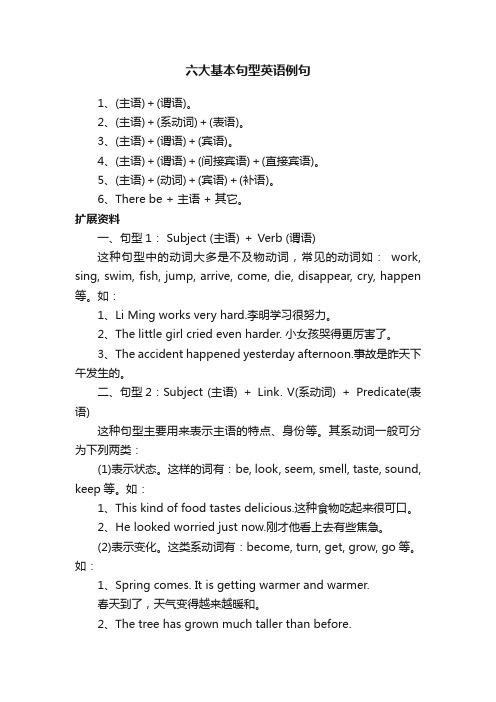
六大基本句型英语例句1、(主语)+(谓语)。
2、(主语)+(系动词)+(表语)。
3、(主语)+(谓语)+(宾语)。
4、(主语)+(谓语)+(间接宾语)+(直接宾语)。
5、(主语)+(动词)+(宾语)+(补语)。
6、There be + 主语 + 其它。
扩展资料一、句型1: Subject (主语) + Verb (谓语)这种句型中的动词大多是不及物动词,常见的动词如:work, sing, swim, fish, jump, arrive, come, die, disappear, cry, happen 等。
如:1、Li Ming works very hard.李明学习很努力。
2、The little girl cried even harder. 小女孩哭得更厉害了。
3、The accident happened yesterday afternoon.事故是昨天下午发生的。
二、句型2:Subject (主语) + Link. V(系动词) + Predicate(表语)这种句型主要用来表示主语的特点、身份等。
其系动词一般可分为下列两类:(1)表示状态。
这样的词有:be, look, seem, smell, taste, sound, keep等。
如:1、This kind of food tastes delicious.这种食物吃起来很可口。
2、He looked worried just now.刚才他看上去有些焦急。
(2)表示变化。
这类系动词有:become, turn, get, grow, go等。
如:1、Spring comes. It is getting warmer and warmer.春天到了,天气变得越来越暖和。
2、The tree has grown much taller than before.这棵树比以前长得高多了。
三、句型3:Subject(主语) + Verb (谓语) + Object (宾语)这种句型中的`动词一般为及物动词。
英语常用的句型
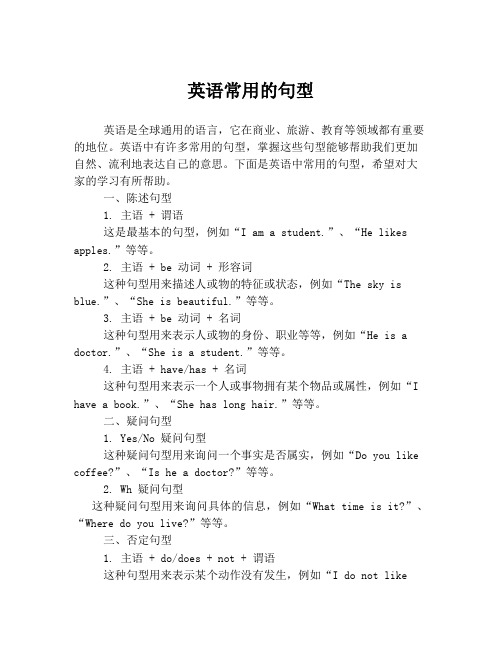
英语常用的句型英语是全球通用的语言,它在商业、旅游、教育等领域都有重要的地位。
英语中有许多常用的句型,掌握这些句型能够帮助我们更加自然、流利地表达自己的意思。
下面是英语中常用的句型,希望对大家的学习有所帮助。
一、陈述句型1. 主语 + 谓语这是最基本的句型,例如“I am a student.”、“He likes apples.”等等。
2. 主语 + be 动词 + 形容词这种句型用来描述人或物的特征或状态,例如“The sky is blue.”、“She is beautiful.”等等。
3. 主语 + be 动词 + 名词这种句型用来表示人或物的身份、职业等等,例如“He is a doctor.”、“She is a student.”等等。
4. 主语 + have/has + 名词这种句型用来表示一个人或事物拥有某个物品或属性,例如“I have a book.”、“She has long hair.”等等。
二、疑问句型1. Yes/No 疑问句型这种疑问句型用来询问一个事实是否属实,例如“Do you like coffee?”、“Is he a doctor?”等等。
2. Wh 疑问句型这种疑问句型用来询问具体的信息,例如“What time is it?”、“Where do you live?”等等。
三、否定句型1. 主语 + do/does + not + 谓语这种句型用来表示某个动作没有发生,例如“I do not likecoffee.”、“She does not watch TV.”等等。
2. 主语 + be 动词 + not + 形容词/名词这种句型用来表示一个人或物没有某个特征或状态,例如“The sky is not blue.”、“She is not a doctor.”等等。
四、感叹句型1. How + 形容词/副词 + 主语 + 谓语!这种句型用来表达强烈的情感或评价,例如“How beautiful the flowers are!”、“How fast he runs!”等等。
84个英语句式

以下是84个常见的英语句式:1. 主语+ 系动词+ 表语2. 主语+ 不及物动词3. 主语+ 及物动词+ 宾语4. 主语+ 及物动词+ 双宾语5. 主语+ 及物动词+ 复合宾语6. 主语+ 系动词+ 表语(主系表结构)7. 主语+ 谓语(主谓结构)8. 主语+ 谓语+ 宾语(主谓宾结构)9. 主语+ 谓语+ 间接宾语+ 直接宾语(主谓双宾语结构)10. 主语+ 谓语+ 宾语+ 宾补(主谓宾补结构)11. 强调句型:It is/was + 被强调部分+ that/who + 其他部分12. 倒装句型:将句子中的某一部分提前,常见的有全部倒装和部分倒装13. 并列句型:两个或多个简单句,由并列连词连接14. 从属句型:一个从句作主句的宾语、定语或状语等成分,构成主从复合句15. 时态句型:表示动作发生的时间和状态,如现在进行时、过去完成时等16. 被动句型:将动作的承受者作为主语,表示被动关系17. 虚拟语气句型:表示与实际情况相反的情况,或者表达主观愿望和假设情况18. 比较句型:表示比较关系,如比较级、最高级等19. 让步句型:表示尽管存在某种条件,但结果仍然成立的情况20. 原因句型:表示原因或理由,常用于解释某个事实或情况的原因21. 结果句型:表示结果或结论,常用于描述某个行为或情况导致的结果22. 条件句型:表示条件或假设,常用于描述某种条件下的情况或结果23. 目的句型:表示行为的目的或意图,常用于解释某个行为的原因或目的24. 让步从句:表示尽管存在某种条件,但结果仍然成立的情况,常用于从句中25. 原因从句:表示原因或理由,常用于解释某个事实或情况的原因,常用于从句中26. 结果从句:表示结果或结论,常用于描述某个行为或情况导致的结果,常用于从句中27. 时间状语从句:表示时间关系的从句,常用于描述某个行为发生的时间点或时间段28. 条件状语从句:表示条件或假设的从句,常用于描述某种条件下的情况或结果,常用于从句中29. 让步状语从句:表示尽管存在某种条件,但结果仍然成立的情况,常用于从句中30. 比较状语从句:表示比较关系的从句,常用于描述两个事物之间的比较关系,常用于从句中31. 目的状语从句:表示行为的目的或意图的从句,常用于解释某个行为的原因或目的,常用于从句中32. 定语从句:修饰名词或代词的从句,常用于描述事物的性质、特征或属性等,常用于从句中33. 同位语从句:解释说明前面名词的内容、性质、特征等,常用that, what等引导词引导,常用于从句中。
常见的45个英语句型
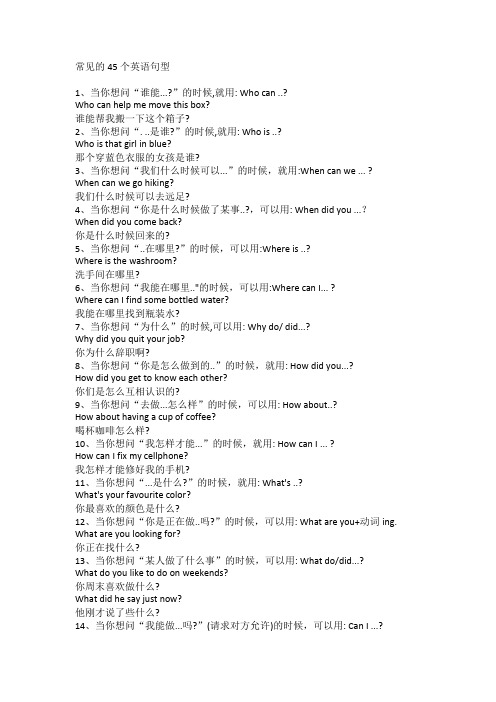
常见的45个英语句型1、当你想问“谁能...?”的时候,就用: Who can ..?Who can help me move this box?谁能帮我搬一下这个箱子?2、当你想问“. ..是谁?”的时候,就用: Who is ..?Who is that girl in blue?那个穿蓝色衣服的女孩是谁?3、当你想问“我们什么时候可以...”的时候,就用:When can we ... ? When can we go hiking?我们什么时候可以去远足?4、当你想问“你是什么时候做了某事..?,可以用: When did you ...?When did you come back?你是什么时候回来的?5、当你想问“..在哪里?”的时候,可以用:Where is ..?Where is the washroom?洗手间在哪里?6、当你想问“我能在哪里.."的时候,可以用:Where can I... ?Where can I find some bottled water?我能在哪里找到瓶装水?7、当你想问“为什么”的时候,可以用: Why do/ did...?Why did you quit your job?你为什么辞职啊?8、当你想问“你是怎么做到的..”的时候,就用: How did you...?How did you get to know each other?你们是怎么互相认识的?9、当你想问“去做...怎么样”的时候,可以用: How about..?How about having a cup of coffee?喝杯咖啡怎么样?10、当你想问“我怎样才能...”的时候,就用: How can I ... ?How can I fix my cellphone?我怎样才能修好我的手机?11、当你想问“...是什么?”的时候,就用: What's ..?What's your favourite color?你最喜欢的颜色是什么?12、当你想问“你是正在做..吗?”的时候,可以用: What are you+动词ing. What are you looking for?你正在找什么?13、当你想问“某人做了什么事”的时候,可以用: What do/did...?What do you like to do on weekends?你周末喜欢做什么?What did he say just now?他刚才说了些什么?14、当你想问“我能做...吗?”(请求对方允许)的时候,可以用: Can I ...?Can I take a look at your notebook?我能看一下你的笔记本吗?15、当你想问“你能做... 吗?”,提出请求的时候,可以用: Could you/Would you...? Could you tell me what time the store is open?你能告诉我这家店几点营业吗?16、当你想问“你是...吗?”的时候,就用: Are you...?Are you Mr. Brown?你是布朗先生吗?Are you making dinner now?你现在是在做晚饭吗?17、除此之外,问对方很多其他情况,都可以用: Doyou+动词...Do you need any help?你需要帮助吗?Do you mind if I open the window?你介意我打开窗户吗?18、当你想要问“你是否(已经)做了某件事”的时候,可以用: Have you ..? Have you seen the message I sent you?你(已经)看到我发给你的信息了吗?19、当你想问某事物的情况的时候, 可以用: Is it ..?Is it close to your house?那离你家近吗?20、当你想陈述自己的情况和观点的时候,可以用: I'm (not)+形容词/名词I'm good at dancing.我擅长跳舞。
100句英语常用句型
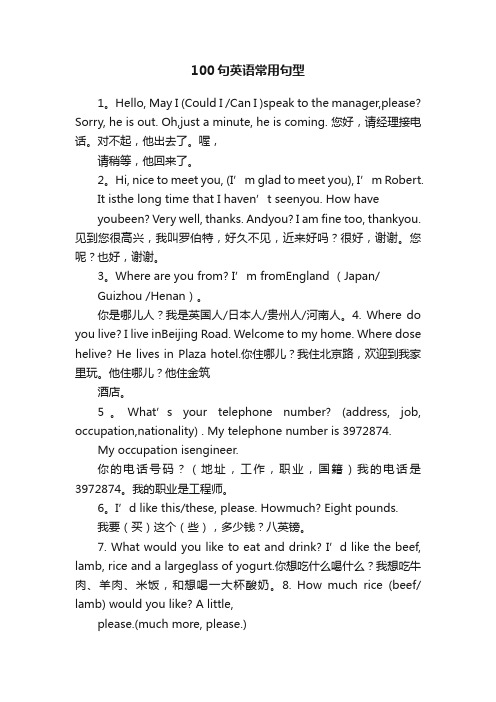
100句英语常用句型1。
Hello, May I (Could I /Can I )speak to the manager,please? Sorry, he is out. Oh,just a minute, he is coming. 您好,请经理接电话。
对不起,他出去了。
喔,请稍等,他回来了。
2。
Hi, nice to meet you, (I’m glad to meet you), I’m Robert.It isthe long time that I haven’t seenyou. How haveyoubeen? Very well, thanks. Andyou? I am fine too, thankyou. 见到您很高兴,我叫罗伯特,好久不见,近来好吗?很好,谢谢。
您呢?也好,谢谢。
3。
Where are you from? I’m fromEngland (Japan/Guizhou /Henan)。
你是哪儿人?我是英国人/日本人/贵州人/河南人。
4. Where do you live? I live inBeijing Road. Welcome to my home. Where dose helive? He lives in Plaza hotel.你住哪儿?我住北京路,欢迎到我家里玩。
他住哪儿?他住金筑酒店。
5。
What’s your telephone number? (address, job, occupation,nationality) . My telephone number is 3972874.My occupation isengineer.你的电话号码?(地址,工作,职业,国籍)我的电话是3972874。
我的职业是工程师。
6。
I’d like this/these, please. Howmuch? Eight pounds.我要(买)这个(些),多少钱?八英镑。
英语常用的62个万能句型
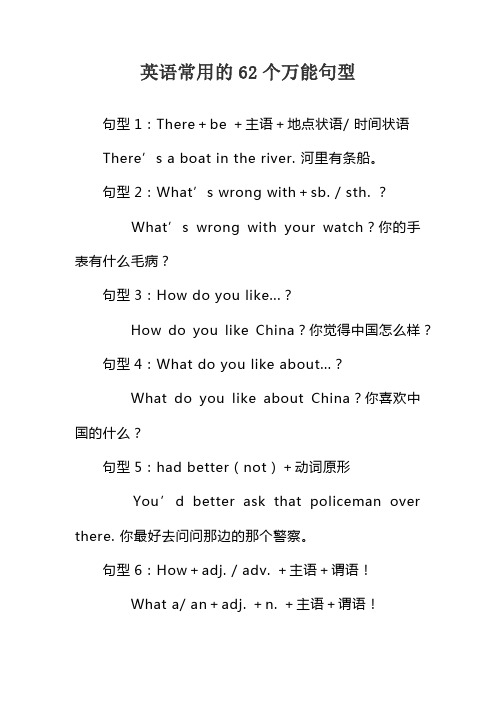
英语常用的62个万能句型句型1:There+be +主语+地点状语/ 时间状语There’s a boat in the river. 河里有条船。
句型2:What’s wrong with+sb. / sth. ?What’s wrong with your watch?你的手表有什么毛病?句型3:How do you like...?How do you like China?你觉得中国怎么样?句型4:What do you like about...?What do you like about China?你喜欢中国的什么?句型5:had better(not)+动词原形You’d better ask that policeman over there. 你最好去问问那边的那个警察。
句型6:How+adj. / adv. +主语+谓语!What a/ an+adj. +n. +主语+谓语!How cold it is today !今天多冷啊!What a fine picture it is!多美的一幅图画呀!句型7:Thank+sb. +for(doing)sth.Thank you for coming to see me. 感谢你来看我。
句型8:So+be/ 情态动词/ 助动词+主语He is a student. So am I. 他是一个学生,我也是。
句型9:... not ... until ...He didn’t have supper until his parents came back. 直到他的父母回来他才吃饭。
句型10:比较级+and+比较级The baby cried harder and harder. 那孩子哭得越来越厉害。
句型11:the +比较级,the +比较级The more one has,the more one wants. 越有越贪。
句型12:... as +adj./ adv.+as ...…not as(so) +adj. / adv. +as ...Do you think that art is as important as music?你认为艺术和音乐一样重要吗?Last Sunday the weather was not so wet as it is today. 上个星期天的天气不如今天的天气潮湿。
英语口语中最常用的30个句型
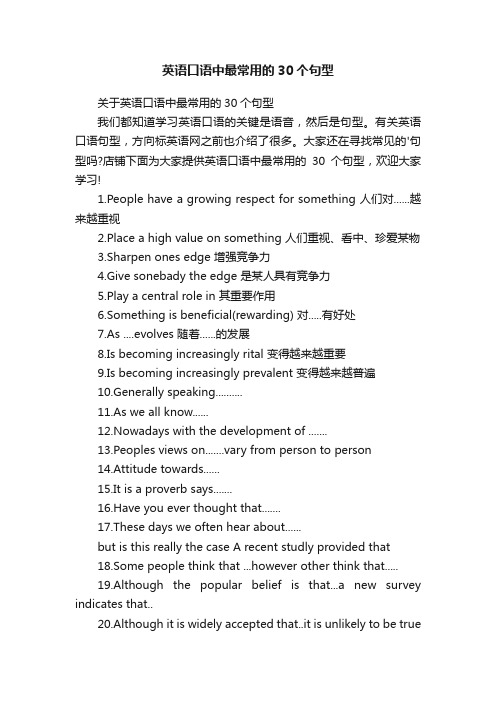
英语口语中最常用的30个句型关于英语口语中最常用的30个句型我们都知道学习英语口语的关键是语音,然后是句型。
有关英语口语句型,方向标英语网之前也介绍了很多。
大家还在寻找常见的'句型吗?店铺下面为大家提供英语口语中最常用的30个句型,欢迎大家学习!1.People have a growing respect for something 人们对......越来越重视2.Place a high value on something 人们重视、看中、珍爱某物3.Sharpen ones edge 增强竞争力4.Give sonebady the edge 是某人具有竞争力5.Play a central role in 其重要作用6.Something is beneficial(rewarding) 对.....有好处7.As ....evolves 随着......的发展8.Is becoming increasingly rital 变得越来越重要9.Is becoming increasingly prevalent 变得越来越普遍10.Generally speaking..........11.As we all know......12.Nowadays with the development of .......13.Peoples views on.......vary from person to person14.Attitude towards......15.It is a proverb says.......16.Have you ever thought that.......17.These days we often hear about......but is this really the case A recent studly provided that18.Some people think that ...however other think that.....19.Although the popular belief is that...a new survey indicates that..20.Although it is widely accepted that..it is unlikely to be truethat.21.It is one thing to believe that..it is quite another to say that..22.There are a variety of cause for this extraordinary growth in....First.....second.....finally....23.I fully agree with the stutement that....the reason are chieflyas follows....24.Judging from all evidence we may safely draw the concldsion that..25.Frow what hava been discussed above we may say that......26.All the evidence supports a condusion that.....27.It is therefore clear that.....So we must be aware of the importance of .......28.Since all of us have realized....why not.......29.It is high time we put an end to ....30.It is necessary that effective actions should be taken to preventthe situation......【关于英语口语中最常用的30个句型】。
英语常用句型就这58句
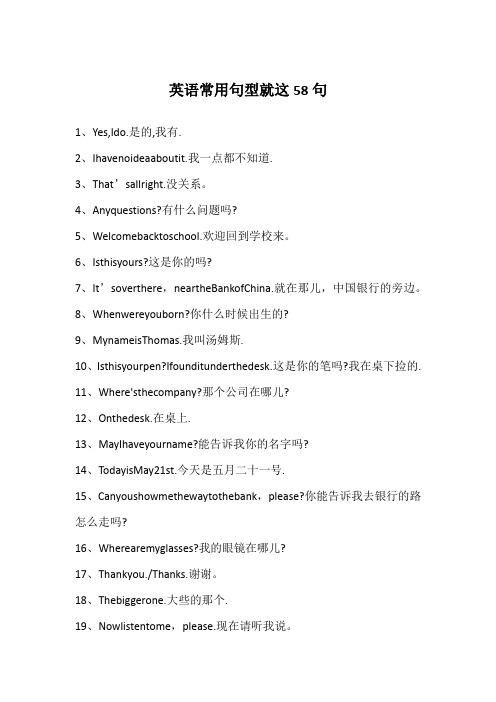
英语常用句型就这58句1、Yes,Ido.是的,我有.2、Ihavenoideaaboutit.我一点都不知道.3、That’sallright.没关系。
4、Anyquestions?有什么问题吗?5、Welcomebacktoschool.欢迎回到学校来。
6、Isthisyours?这是你的吗?7、It’soverthere,neartheBankofChina.就在那儿,中国银行的旁边。
8、Whenwereyouborn?你什么时候出生的?9、MynameisThomas.我叫汤姆斯.10、Isthisyourpen?Ifounditunderthedesk.这是你的笔吗?我在桌下捡的.11、Where'sthecompany?那个公司在哪儿?12、Onthedesk.在桌上.13、MayIhaveyourname?能告诉我你的名字吗?14、TodayisMay21st.今天是五月二十一号.15、Canyoushowmethewaytothebank,please?你能告诉我去银行的路怎么走吗?16、Wherearemyglasses?我的眼镜在哪儿?17、Thankyou./Thanks.谢谢。
18、Thebiggerone.大些的那个.19、Nowlistentome,please.现在请听我说。
20、What’syourname,please?你的名字是什么?21、It'stwoo'clock.现在两点.22、Hehasthatbook,doesn'the?他有那本书,是吗?23、Whattimeisitnow?现在几点?24、Happybirthday!生日快乐!25、Let’splayagametoday.今天我们来做个游戏。
26、Theoneonyourright.你右边的那个.27、Yes./Allright.Hereyouare.好的。
给你。
28、He'samanager.他是个经理.29、Yes,Iam./No,I'mnot.是,我是./不,我不是.30、Excuseme,what’sthetime,please?请问,几点了?31、Howabouttheblueone?这条蓝色的如何?32、Let’sgotoschool.让我们去学校吧。
英语学习常用的62个句型,地道口语
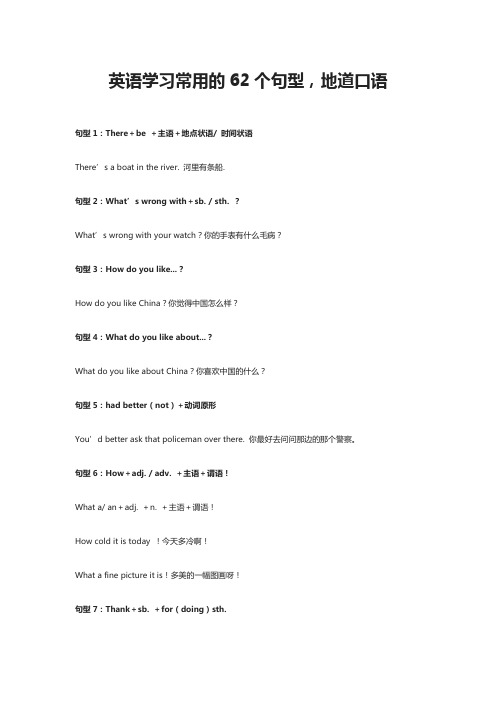
英语学习常用的62个句型,地道口语句型1:There+be +主语+地点状语/ 时间状语There’s a boat in the river. 河里有条船.句型2:What’s wrong with+sb. / sth. ?What’s wrong with your watch?你的手表有什么毛病?句型3:How do you like...?How do you like China?你觉得中国怎么样?句型4:What do you like about...?What do you like about China?你喜欢中国的什么?句型5:had better(not)+动词原形You’d better ask that policeman over there. 你最好去问问那边的那个警察。
句型6:How+adj. / adv. +主语+谓语!What a/ an+adj. +n. +主语+谓语!How cold it is today !今天多冷啊!What a fine picture it is!多美的一幅图画呀!句型7:Thank+sb. +for(doing)sth.Thank you for coming to see me. 感谢你来看我。
句型8:So+be/ 情态动词/ 助动词+主语He is a student. So am I. 他是一个学生,我也是。
句型9:... not ... until ...He didn’t have supper until his parents came back. 直到他的父母回来他才吃饭。
句型10:比较级+and+比较级The baby cried harder and harder. 那孩子哭得越来越厉害。
句型11:the +比较级,the +比较级The more one has,the more one wants. 越有越贪。
英语十四个句型
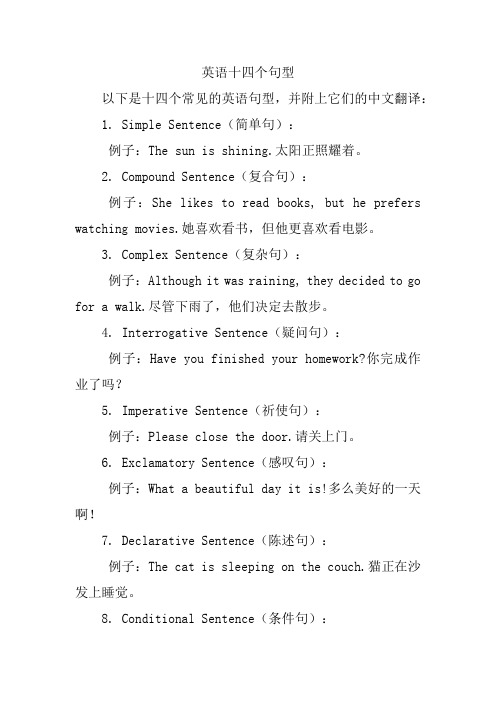
英语十四个句型以下是十四个常见的英语句型,并附上它们的中文翻译:1. Simple Sentence(简单句):例子:The sun is shining.太阳正照耀着。
2. Compound Sentence(复合句):例子:She likes to read books, but he prefers watching movies.她喜欢看书,但他更喜欢看电影。
3. Complex Sentence(复杂句):例子:Although it was raining, they decided to go for a walk.尽管下雨了,他们决定去散步。
4. Interrogative Sentence(疑问句):例子:Have you finished your homework?你完成作业了吗?5. Imperative Sentence(祈使句):例子:Please close the door.请关上门。
6. Exclamatory Sentence(感叹句):例子:What a beautiful day it is!多么美好的一天啊!7. Declarative Sentence(陈述句):例子:The cat is sleeping on the couch.猫正在沙发上睡觉。
8. Conditional Sentence(条件句):例子:If it rains, we will stay indoors.如果下雨,我们会呆在室内。
9. Passive Voice Sentence(被动语态句):例子:The cake was baked by Mary.蛋糕是玛丽烤的。
10. Direct Speech Sentence(直接引语句):例子:She said, "I will be there at 5 o'clock."她说:“我会在5点钟到那里。
- 1、下载文档前请自行甄别文档内容的完整性,平台不提供额外的编辑、内容补充、找答案等附加服务。
- 2、"仅部分预览"的文档,不可在线预览部分如存在完整性等问题,可反馈申请退款(可完整预览的文档不适用该条件!)。
- 3、如文档侵犯您的权益,请联系客服反馈,我们会尽快为您处理(人工客服工作时间:9:00-18:30)。
英语常用句型(一)段首句1. 关于……人们有不同的观点。
一些人认为……There are different opinions among people as to ____ .Some people suggest that ____. 2. 俗话说(常言道)……,它是我们前辈的经历,但是,即使在今天,它在许多场合仍然适用。
There is an old saying______. Its the experience of ourforefathers,however,it is correct in many cases even today.3. 任何事物都是有两面性,……也不例外。
它既有有利的一面,也有不利的一面。
Everything has two sides and ______ is not an exception,it has bothdisadvantages. advantages and4. …… 已成为人的关注的热门话题,特别是在年青人当中,将引发激烈的辩论。
______ has become a hot topic among people,especially among the youngand heated debates are right on their way. 5. …… 在我们的日常生活中起着越来越重要的作用,它给我们带来了许多好处,但同时也引发一些严重的问题。
______ has been playing an increasingly important role in our day-to-day life. It has brought us a lot of benefits but has created some serious problems as well. 6. 根据图表/数字/统计数字/图表/条形图/成形图可以出……。
很显然……, According to the figure/number/statistics/chart/bar graph/line/graph,it can be seen that______ while. Obviously,______, (二)中间段落句1. 相反,有一些人赞成……,他们相信……,而且,他们认为……。
On the contrary,there are some people in favor of ___.At the same time,they say____. 2. 但是,我认为这不是解决……的好方法,比如……。
最糟糕的是……。
But I don’t think it is a very good way to solve ____.For example,____.Worst of all,___.3. 有几个可供我们采纳的方法。
首先,我们可以……。
There are several measures for us to adopt. First, we can______ 4.面临……,我们应该采取一系列行之有效的方法来……。
一方面……,另一方面Confronted with______,we should take a series of effective measures to______. For one thing,______For another,______5. 早就应该拿出行动了。
比如说……,另外……。
所有这些方法肯定会……。
It is high time that something was done about it. For example_____.In addition _____.All these measures will certainly______.6. 尽管如此,我相信……更有利。
Nonetheless, I believe that ______is more advantageous.问题的常用词:question, problem, issue1.Recently, the issue of ...... has been brought into public focus.2.Now we are entering a brand new era full of opportunities and innovations, and great changes have taken place in people's attitude towards some traditional practice.现在我们进入了一个充满机遇和创新的崭新时代,很多人对某些传统的看法也发生了很大改变。
3.Recently the issue of whether or not ... has been in the limelight and has aroused wide concern in the public.近来,是否_______的问题已经非常明确而且引起了社会的广泛关注。
4.The issue whether it is good or not to .... has aroused a heated discussion all over the country. ______的利与弊已在全国范围内引起热烈的讨论。
5.At present, some people think ....while others claim ...Both sides have their merits.目前,一些人认为_______而另一些人则认为_______。
其实,两种观点都其可取之处。
6.People rarely reach an absolute consensus on such a controversial issue. 对于这种极具争议的话题,我们很难作出绝对的回答。
7.People from different backgrounds would put different interpretations on the same case.不同行业的人对同一种问题的解释不尽相同。
8.The controversial issue is often brought into public focus. People from different backgrounds hold different attitudes towards theissue. 这中极具争议性的话题往往很受社会的关注。
不同的人对此问题的看法也不同。
9.Just as the saying goes: "so many people, so many minds". It is quite understandable that views on this issue vary from person to person. 俗话说,""。
不同的人对此有不同的看法是可以理解的。
10.To this issue, different people come up with various attitudes. 对于这个问题,不同的人持不同的观点。
11.There is a good side and a bad side to everything, it goeswithout saying that...万事万物都有其两面性,所以,勿庸置疑,____________。
12.When it comes to ..., most people believe that ..., but other people regard ...as ....提到_________问题,很多人认为_________,不过,一些人则认为______是____. 13.When faced with...., quite a few people claim that ...., but other people think as...提到_________问题,极少数人认为________,但另一些人则认为_________。
14.Many people claim that...很多人认为_____________。
15.A majorityof 绝大多数 A large number of 很多人16.Some people contend that ... has proved to bring many advantages (disadvantages) 有些人认为________有很多有利之处(不利之处)。
17.People, who advocate that ..., have their sound reasons (grounds) 坚持认为______的人也有其说法(依据)。
18.Those who have already benefited from practicing it sing high praiseof it.那些从中受益的人对此大家褒奖。
19.But others hold the view that ...但是,另外一些人则认为_______。
20.But on the other hand, there are also quite a few people who strongly advocate that..,.不过,另一方面,也有少部分人坚持认为_______________。
21.But people who are ..., on the other hand , maintain that...不过,另一方面,________的人认为__________。
22.However, there are a large number of people who hold a different view concerning this case. 然而,很多人对此有不同的看法。
